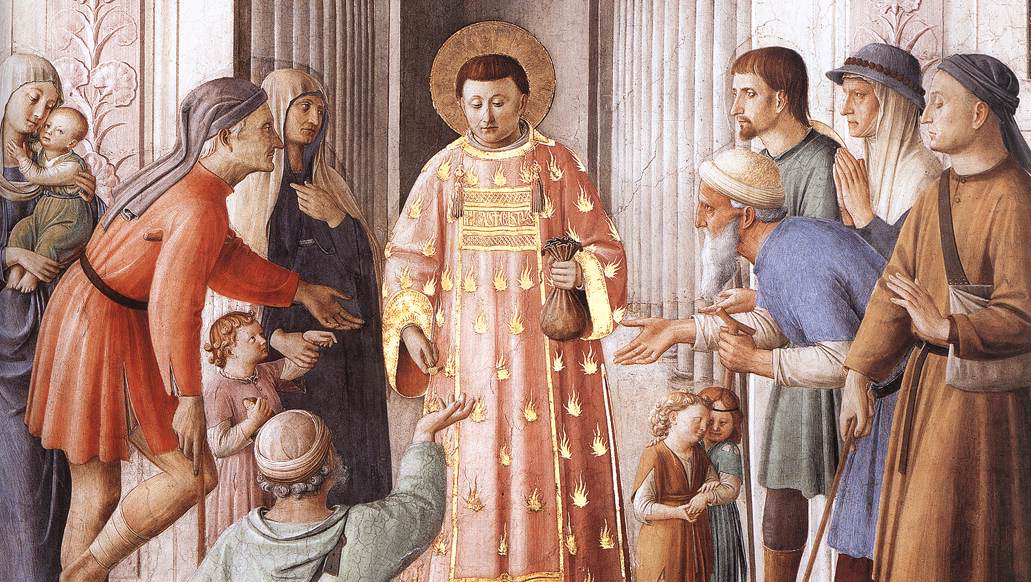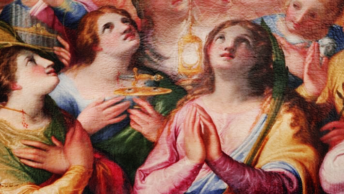In the Acts of the Apostles (6:1-7), we hear about the first deacons. They were ordained by the overburdened Apostles who needed their help in caring for and providing services for the growing number of Christians in their communities. It’s interesting to note that the Apostles ordained deacons before the first priests were ordained. Such was the importance of service in the minds of the Apostles.
Today, many pastors of large parishes are overburdened and need the help of deacons. That reality accounts for the fact that there are now about 18,000 deacons serving in parishes here in the United States…and their numbers are continuing to increase. Our American bishops began to ordain permanent deacons, married deacons, for the United States in the early 1970’s and their numbers have been growing ever since.
The ministry of deacons emphasizes our communal roles in liturgy, preaching, and service. Prior to the Second Vatican Council there were deacons but they were found only in seminaries where young men received that Sacred Order only in the last year of their preparation for ordination as priests. Now, by the grace of God, the ministry of deacons is a vital part of the life of the Church in our parishes.
Deacons are leaders, leaders who are other-serving, not self-serving. With their vision and convictions they lead us and inspire us in our shared journey through life, a journey in which they are our companions. Our journey through life is after all, “ours,” not simply my own. We should realize that the things deacons do are not done for us, they are done with us. In their service, deacons bring us all into the awareness that we belong to each other and therefore belong to God. They make visible the truth that we all share a common call from God, namely to care for and serve others, particularly those who are in need.
What are the areas in which deacons now serve us? Deacons witness to the Gospel through lives of ordained service. Among other things they minister to the poor, the aged, the infirm, and prisoners in jails. They participate in programs dealing with community problems like substance abuse or child abuse. Deacons work with youth and young adults in various parish and community programs. Their opportunities of service are limitless. In our liturgies and in our worship services deacons proclaim the Gospel and preach. By their examples they are effective agents of evangelization in our world. They teach in religious education programs, sacramental preparation programs such as baptism and marriage and in RCIA programs. In other words, they are agents of spiritual formation. Deacons not only assist in Eucharistic Celebrations, administer baptism and witness marriages, they also officiate at wakes and funerals along with presiding at prayer services such as communion services and benediction of the Blessed Sacrament.
The call to be a deacon is God’s call to serve. A symbol of the ministry of the deacon is the basin and the towel, the items Jesus used when he washed the feet of the apostles, illustrating how we are called to love and serve others.
The deacon brings the needs of the marginalized, the poor, the imprisoned, the sick and disabled to the altar. He sees to it that they are not forgotten or excluded from the liturgical and communal life of the parish.
The role of the priest is, of course, to help the members of his parish grow spiritually, leading them in ways to better love God and neighbor. But many priests need the assistance of deacons in fulfilling that mission. Nevertheless, only the priest can preside at Mass and consecrate the Eucharist, hear confessions, have authority to forgive sins, anoint the sick and the dying, and, with delegation from the Bishop, confirm.
Deacons give us living witness to what we all should be about, namely heeding God’s call for us to feed the hungry, give drink to the thirsty, visit the imprisoned, bury the dead, clothe the naked, visit the sick, and shelter the homeless. What empowers deacons and energizes them is their ministry of the Word wherein they proclaim the Word of God in scripture to the faithful and instruct and exhort God’s people.
All that deacons do they bring to God’s altar to be joined into Christ. Thus deacons administer Baptism solemnly, distribute the Eucharist, assist and bless marriages in the name of the Church, take Viaticum to the dying, preside over the worship and the prayer services of the faithful, and officiate at funerals and burial services. All of their work they bring to the altar of God.
In discussing the question of married priests, if you wish to exactly correct, you need to speak with the distinctions I am about to mention. The Universal Catholic Church already has married priests, priests in the Eastern Rites of the Catholic Church. It is the Roman Catholic Rite that does not have married priests. So when we speak of married clergy, we should note that the wider Catholic Church already has them. We even have married clergy in the Roman Church, namely men in Holy Orders who are married — our deacons. Deacons are clergy, and they are clergy in Holy Orders!
It is often argued that those who are ordained priests should not be married in order that they might fully devote themselves to the work of the Church. But that argument does not stand up when we consider deacons. Our married deacons are fully involved in the ministries of our Church. Being married doesn’t hinder them. Because that is so, our married deacons demonstrate that it is quite possible for us to have married priests, married priests who, like our deacons, are fully involved in carrying on the ministries of our Church.
Deacons are collaborators, “co-laborers” with their pastors and with the people of their parishes. They go out into the vineyards of their parishes and discern what should be pruned and what needs to be planted. They bring into the light those places where there is need for newness and those places where the past is controlling but in ways of doing things that are no longer effective, places and methods that are now fruitless. Deacons can “go to the peripheries,” as Pope Francis puts it, and bring the goodness of God’s presence to those places where new life can be, by God’s graces, allowed to grow and develop. Isn’t that what Pope Francis is calling us to do… and is himself doing? This isn’t simply a stylistic change, it’s a substantive change in living out what Jesus is giving us. Isn’t that what St. Paul declares to be: “the glorious freedom of the sons and daughters of God”?
The final words heard at the conclusion of Mass are: “Go in peace, glorifying the Lord by your life.” That is, we come to Mass to receive in order that we might give. What we receive at Mass, we give in our daily lives. This coming week, do something. Pick out something that deacons do and then do it. How can the Lord be glorified if you do nothing? The worst thing you can do is do nothing.
Be like a deacon this week.








It’s funny that I should read this piece about deacons. A couple of Sundays ago, I went to a local neighborhood church rather than my home parish. The deacon looked familiar to me and my husband confirmed that he was from another parish we used to attend.
I know, “judge not lest ye be judged”, but to my mind this deacon is less than reverent. As the priests were getting ready to start the procession down the main aisle to the altar, this deacon went to a parishioner already seated in the pew and loudly said hello. Shouldn’t one be placing themselves in the presence of the Lord to participate in the Holy Mass?
Every time the prayers ended he said his “Amen” like he was a carnival barker. When he sat on his chair to the right of the main celebrant, he slouched and crossed his legs, showing his multi-colored socks.
At the end of Mass when he said the words, “Go in peace, to love”, he pointed at the congregation with both hands and fingers as if he was holding six-shooters and the congregation responded loudly “and serve the Lord”. I could not believe it.
I am 65 years old and a cradle catholic, so I have been through a lot of changes in the church. But I have never seen anything like this. If I was new to this area and looking for a good parish to become a member, I certainly would not pick this one.
I was going to write a letter to the pastor, but after reading the “Catholic Journal” article, I thought I would write to you. Thank you for allowing me to vent.
Praise be Lord Jesus Christ, forever and ever!